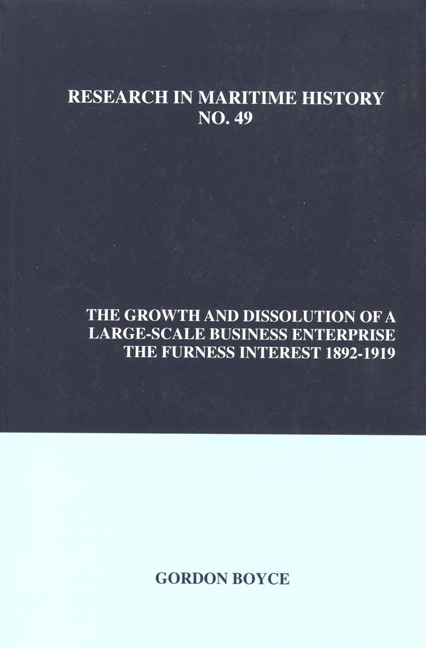Book contents
- Frontmatter
- Table of Contents
- About the Author
- Acknowledgements
- Figures and Tables
- Introduction
- Chapter 1 Furness' Shipping Services: Growth by Organic Means in the 1880s
- Chapter 2 The 1890s: Furness Withy's Expansion by Acquisition and Promotion
- Chapter 3 Diversification into the Industrial Sector, 1895-1901
- Chapter 4 Trouble on the Transatlantic Route: The Formation of the IMM and Furness' Response
- Chapter 5 The Growth of Shipping Services, 1902-1909
- Chapter 6 Industrial Operations and Performance, 1900-1914
- Chapter 7 The Growth of the Shipping Interests, 1910-1919
- Chapter 8 Structure
- Chapter 9 Finance
- Chapter 10 Holding Company Investment Activities and Intermediary Operations
- Chapter 11 Personnel
- Chapter 12 Furness
- Chapter 13 Dissolution
- Appendix 1 Development of the Combined Fleet, 1900-1919
- Appendix 2a Patterns of Ownership: The Furness Group, 1919
- Appendix 2b Reorganization of Branch Offices and Superintending Departments, 1911-1912
- Appendix 3a Fluctuations in Freights, Profits, Tonnage Afloat and Merchant Shipping Output
- Appendix 3b Output of Merchant Tonnage (Excluding Warships), 1892-1913
- Appendix 3c Fluctuations in the Price of a 7500-ton Cargo Steamer, 1898-1913
- Appendix 4 Development of the Furness Group: Principal Promotions, Acquisitions and Divestments, 1880-1919
- Appendix 5 Northern Allies and Maritime Associates
- Appendix 6 Contemporary Accounting Law and Conventions, 1845-1914
- Appendix 7 Lord Furness' Movements, 1899-1912
- Bibliography
Chapter 11 - Personnel
- Frontmatter
- Table of Contents
- About the Author
- Acknowledgements
- Figures and Tables
- Introduction
- Chapter 1 Furness' Shipping Services: Growth by Organic Means in the 1880s
- Chapter 2 The 1890s: Furness Withy's Expansion by Acquisition and Promotion
- Chapter 3 Diversification into the Industrial Sector, 1895-1901
- Chapter 4 Trouble on the Transatlantic Route: The Formation of the IMM and Furness' Response
- Chapter 5 The Growth of Shipping Services, 1902-1909
- Chapter 6 Industrial Operations and Performance, 1900-1914
- Chapter 7 The Growth of the Shipping Interests, 1910-1919
- Chapter 8 Structure
- Chapter 9 Finance
- Chapter 10 Holding Company Investment Activities and Intermediary Operations
- Chapter 11 Personnel
- Chapter 12 Furness
- Chapter 13 Dissolution
- Appendix 1 Development of the Combined Fleet, 1900-1919
- Appendix 2a Patterns of Ownership: The Furness Group, 1919
- Appendix 2b Reorganization of Branch Offices and Superintending Departments, 1911-1912
- Appendix 3a Fluctuations in Freights, Profits, Tonnage Afloat and Merchant Shipping Output
- Appendix 3b Output of Merchant Tonnage (Excluding Warships), 1892-1913
- Appendix 3c Fluctuations in the Price of a 7500-ton Cargo Steamer, 1898-1913
- Appendix 4 Development of the Furness Group: Principal Promotions, Acquisitions and Divestments, 1880-1919
- Appendix 5 Northern Allies and Maritime Associates
- Appendix 6 Contemporary Accounting Law and Conventions, 1845-1914
- Appendix 7 Lord Furness' Movements, 1899-1912
- Bibliography
Summary
In contrasting a firm's organic growth and expansion by acquisition, Edith Penrose stressed the importance of existing managerial resources as a factor that influences the pace of growth. In pursuing the former course, a company's managerial capacity limits the extent of growth undertaken within a finite period because it takes time to recruit, train and acculturate new personnel. Learning costs may also be an increasingly significant factor as the firm expands by organic means beyond its core knowledge base, and more especially if it enters unrelated business fields. Thus, expansion using existing resources involves overcoming internal constraints and external barriers to entry. On the other hand, acquisition may mitigate impediments arising from both of these sources. Purchasing a company reduces hiring and training costs when existing managers are retained, and this policy may also serve to overcome entry barriers. Whichever strategy is pursued, the growing firm must resolve the necessary “conflict between the speed of expansion and the maintenance of efficient managerial co-ordination.”
As we have seen, the structures developed to ensure such effective control are the main subject of Alfred Chandler's work. In his work on structural change, he identified three types of firm determined by changes in ownership and control. Companies run directly by their owners, often with help from a small number of managers who might be taken into partnership, Chandler called the personal enterprise. Larger firms the policies of which were formulated by owners who delegated day-to-day management to salaried executives, he defined as entrepreneurial firms. Finally, when ownership and management became completely divorced as family interests withdrew and policy formation passed to professional salaried officials who held small equity stakes, the managerial enterprise emerged.
Chandler also observed that by 1917, the managerial enterprise was well-established in America, while at about the same time the vast majority of British firms were personal or entrepreneurial. Recently, Leslie Hannah has questioned this pattern of change. Analyzing data on publicly-quoted firms, he found that the divorce of ownership and management occurred earlier in Britain than it did in the US where plutocratic family control did not begin to erode until the 1920s and then fell to the same level recorded in Britain around 1900.
- Type
- Chapter
- Information
- The Growth and Dissolution of a Large-Scale Business EnterpriseThe Furness Interest, 1892-1919, pp. 299 - 320Publisher: Liverpool University PressPrint publication year: 2012



